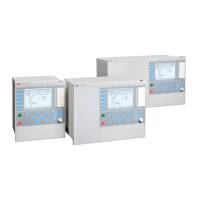is not known, the following approximations may be considered for lines with rated
voltage 400 kV:
• K
L
= 0.9 for lines longer than 100 miles
• K
L
= 0.85 for lines between 50 and 100 miles
• K
L
= 0.8 for lines shorter than 50 miles
Multiply the required resistance for the same safety factor K
L
with the ratio between
actual voltage and 400kV when the rated voltage of the line under consideration is
higher than 400kV. The outer boundary RLdOutFw obtains in this particular case its
value according to equation
299.
min
0.9 137.2 123.5
L L
RLdOutFw K R= × = × = W
EQUATION1343 V1 EN (Equation 299)
It is a general recommendation to set the inner boundary RLdInFw of the oscillation
detection characteristic to 80% or less of its outer boundary. Exceptions are always
possible, but must be considered with special care especially when it comes to settings
of timers tP1 and tP2 included in oscillation detection logic. This requires the
maximum permitted setting values of factor kLdRFw = 0.8. Equation
300 presents the
corresponding maximum possible value of RLdInFw.
RLdInFw = kLdRFw·RLdOutFw = 98.8W
EQUATION1344 V2 EN
(Equation 300)
The load angles, which correspond to external δ
Out
and internal δ
In
boundary of
proposed oscillation detection characteristic in forward direction, are calculated with
sufficient accuracy according to equation
301 and 302 respectively.
155.75
2 arc tan 2 arc tan 64.5
2 2 123.5
d
æ ö
æ ö
ç ÷= × = × = °
ç ÷
ç ÷
× ×
è ø
è ø
S
Out
Z
RLdOutFw
EQUATION1345 V1 EN
(Equation 301)
max
155.75
2 arc tan 2 arctan 76.5
2 2 98.8
d
æ ö
æ ö
ç ÷= × = × = °
ç ÷
ç ÷
× ×
è ø
è ø
S
In
Z
RLdInFw
EQUATION1346 V1 EN (Equation 302)
The required setting tP1 of the initial oscillation detection timer depends on the load
angle difference according to equation 303.
Section 3 1MRK504116-UUS C
IED application
362
Application manual

